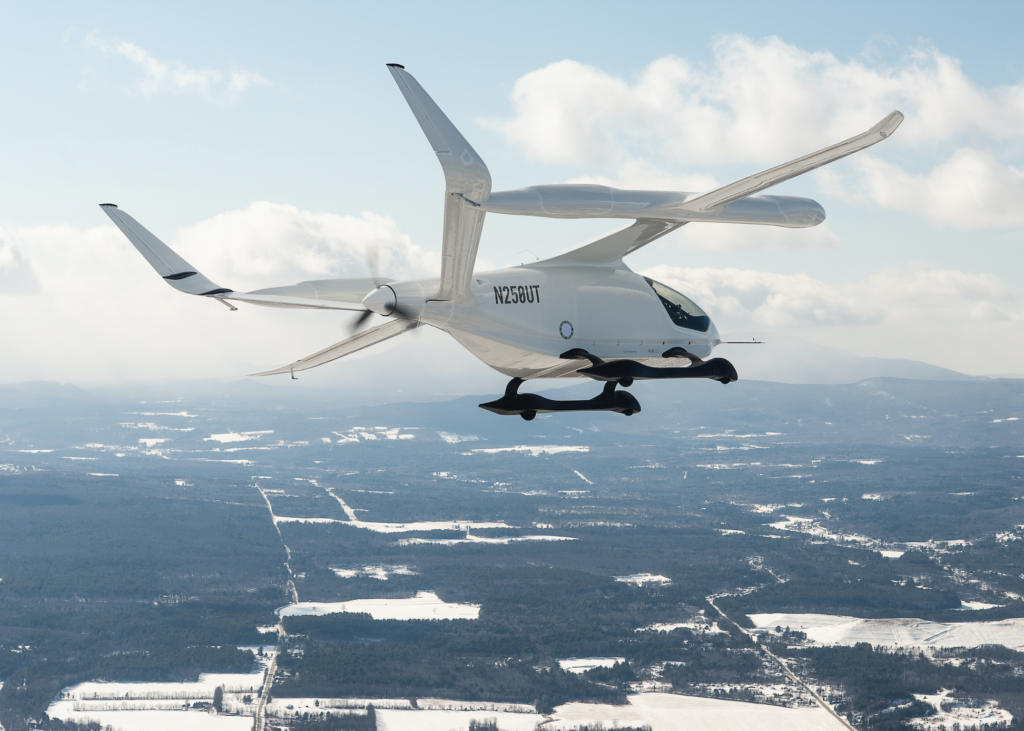
BETA Technologies announced plans to certify its fixed-wing electric aircraft, the CX300, alongside its electric vertical take-off and landing (eVTOL) vehicle, the ALIA. (Photo: BETA)
BETA Technologies announced plans this week to certify its fixed-wing electric aircraft alongside its electric vertical take-off and landing (eVTOL) vehicle, the ALIA. The eCTOL prototype performs conventional take-off and landing. BETA has already flown it more than 22,000 miles during 2+ years of full-scale testing. The eCTOL, the CX300, has undergone qualitative evaluation flights by FAA, Air Force, and Army test pilots and has completed a 386-mile test flight.
BETA’s Founder and CEO, Kyle Clark, commented that they have conducted test flights with the eCTOL prototype along airport-to-airport routes. “Global operators are looking for practical solutions to help meet their sustainability commitments, and after seeing the cost and performance of this prototype, our customers are eager to integrate it into their fleet,” said Clark. “With its known certification and operational path, this aircraft represents an opportunity to get electric aviation into the market, and into the hands of our customers, as quickly as possible.”

The ALIA and the CX300 “are common in their design, allowing us to economize validation of our high performance solutions,” according to BETA’s CEO, Kyle Clark. (Photo: BETA)
United Therapeutics, Bristow, and Air New Zealand are some of the customers that have placed orders for BETA’s eCTOL aircraft. Certification and delivery are expected in 2025. Air New Zealand intends to fly its first zero-emissions commercial demonstrator flight in 2026.
Clark remarked that the ALIA and the CX300 “are common in their design, allowing us to economize validation of our high performance solutions. With the eCTOL aircraft launch we have further de-risked our path to commercialization and concurrently provide lower cost, more utility and optionality to operators. This has given us the confidence to industrialize and invest heavily in production at scale over the last year.”

Pictured above is a comparison of the CX300 and ALIA-250 aircraft. (Photo: BETA)
A partnership between BETA, the UAE government, and UPS was made public recently. The partners are collaborating on the operation of electric aircraft in the UAE. February 28 marked the achievement of a Minimum Viable License, or MVL, to operate BETA’s electric cargo aircraft in the country. The temporary MVL was issued by the UAE Regulations Lab “with an aim to accelerate the shift towards sustainable and eco-friendly transportation modes and enhance the sustainability of the air cargo industry in the UAE,” according to the press release from the UAE Government Media Office. The initial stages of the collaboration will involve the operation of conventional take-off and landing (CTOL) vehicles.
Maryam Al Hammadi, Minister of State, Secretary General of the UAE Cabinet, is quoted as saying, “The Regulations Lab works with a number of experts, legislators from the federal and local government entities, private sector and entrepreneurs. The Lab’s mission is to develop new legislations that contributes to designing and adopting a flexible legislative system that keeps pace with the requirements of sustainability, and aligns the speed of regulations with the speed of innovation.”